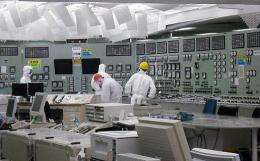Japan lacking radioactive water storage: US experts

Japan's Fukushima Daiichi nuclear plant may have run out of room to store radioactive water, US scientists said Monday after the plant operator reported leaks that could contaminate the ocean.
The stricken plant is likely grappling with massive amounts of water, dumped by helicopter and water cannon for cooling after the power went out in the days following a massive earthquake and tsunami on March 11, said the Union of Concerned Scientists in a conference call with reporters.
While workers have been able to stop injecting corrosive seawater into the reactor cores in units one, two and three, they face a new problem of how to deal with water that is now radioactive and in need of storage and treatment.
"They have a huge amount of radioactively contaminated water," said nuclear expert Dave Lochbaum of the UCS, noting that leaks have been detected in reactor buildings around units one, two and three at the complex.
"It is difficult to determine where that water is coming from. It obviously shouldn't be there in this quantity and it is posing some challenges to the workers," said Lochbaum.
"They need to get some control over that, some place to put it, some processing plant that can treat the water and remove as much radiation as possible," he said.
"I don't want to criticize the fact that they needed to use that water, but the legacy of that problem is one they need to get their arms around quickly."
Edwin Lyman, also of the UCS, said he had also seen reports that "some of the tanks -- the storage tanks where excess water has been accumulated -- are full and some of those tanks will have to be emptied."
If true, those reports would indicate that "the storage capacities are already over-filled. That could explain that the tanks are flooding and they have overflowed leading to these leaks," he said.
"They don't have provisions right away for being able to deal with that water. They have no choice but to continue dumping large quantities of radioactive water into the environment."
Plant operator Tokyo Electric Power Co. (TEPCO) said a large amount of highly radioactive water had leaked from reactor two's turbine building into an underground maintenance tunnel that is now close to overflowing.
"We need to check if the water could flow directly into the sea," a TEPCO official said.
The water is thought to have leaked from the vessel containing the fuel rods -- which are suspected to have temporarily melted -- or from the pipe system.
It was measured at 1,000 millisieverts an hour, a dose that can cause temporary radiation sickness with nausea and vomiting for people who are exposed.
Seawater near the plant has been found to contain radioactive iodine more than 1,850 times the legal limit, although it is not exactly clear how the contamination spread to the Pacific Ocean.
"It is hard to see how this won't result in some significant contamination of seawater," said Lyman.
He added that it was hard to tell whether trace plutonium amounts found in soil at the plant, described by Japanese authorities as unlikely to pose a threat to human health, were a danger or not.
"It is highly dependent on the geochemistry of the particular site," he said, explaining that plutonium can either take on a form that is easily transported in water, or it can become insoluble and absorb into clay in the ground.
"It is a very difficult question," he said.
(c) 2011 AFP
















